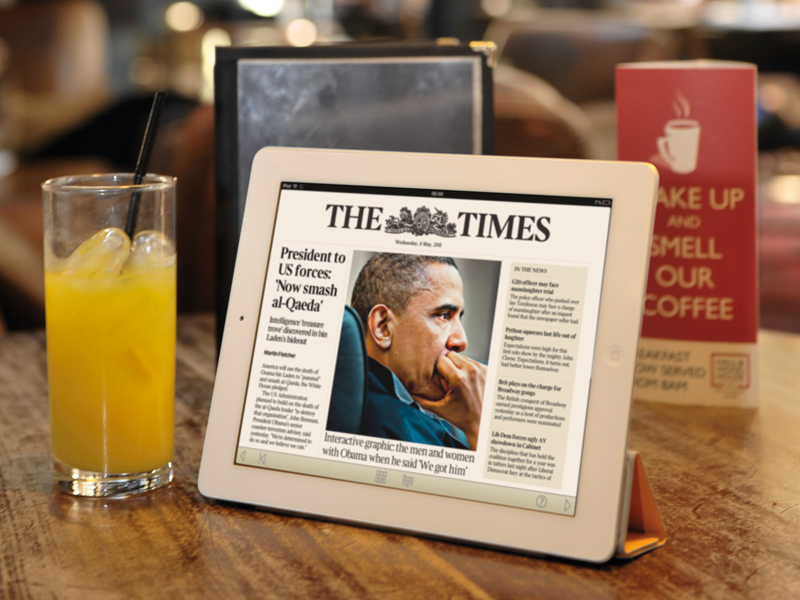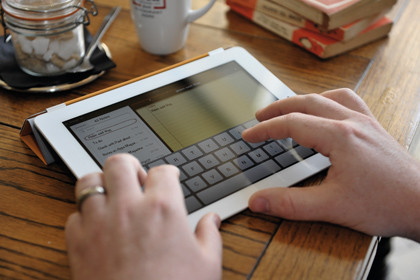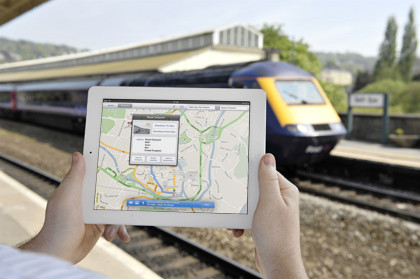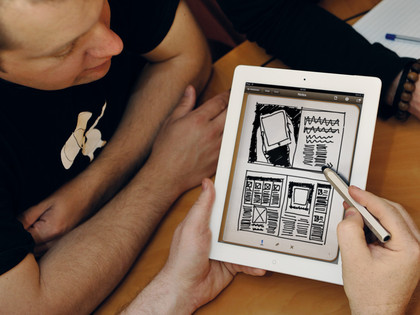Mac or iPad: which is right for you?
An iPad might suit your needs better than a Mac

Sign up for breaking news, reviews, opinion, top tech deals, and more.
You are now subscribed
Your newsletter sign-up was successful
Back in 2008, Apple was getting a lot of flack for not launching a cheap netbook. With the recession starting to bite, netbook sales were booming, but Steve Jobs, Apple CEO, seemed unimpressed.
"The market is just getting started – we'll see how it goes," he said in his characteristically enigmatic style. Then, after a long period of inactivity, Apple launched the iPad, and now nobody is talking about netbooks anymore.
Tablets are the device du jour that everybody wants to own. This month AppleInsider.com reported on speculation that Apple will sell between 40 million and 45 million iPads in 2011. This staggering figure was revealed to analyst Brian White in meetings with component suppliers during a tech trip with Ticonderoga Securities to China and Taiwan.
That's a lot of sales for a device that nobody was sure they actually needed when it launched in 2010. Given the uptake, it seems pretty clear that people who would have normally considered buying a new laptop, or a smaller netbook, are switching to the iPad in droves.
We're now in our third consecutive quarter of a PC notebook sales decline in the US. But while PC sales may have passed their peak, if you factor in the iPad as an Apple computer, the sales are off the charts.
"In an industry where growth is usually measured in single digits, the iPad business brings growth in three digits," reports industry analyst Horace Dediu of Asymco. "The bottom line is that Windows-only PC units are down 2% while OS X-based PC units are up 272% (excluding iPhone and iPod touch)."
Looking at figures like this, you realise that Apple CEO Steve Jobs was on the money when, at the launch of the iPad 2, he said we were moving into the era of the post-PC device.
Sign up for breaking news, reviews, opinion, top tech deals, and more.
But what is it about the iPad that's got everybody so excited? And if you don't have one already, should you really consider getting one instead of your next Mac?
Millions of sales
The iPad's success has baffled many industry analysts who were keen to dismiss it at launch. You can see why they got it so wrong.
Looked at objectively, the iPad is a very limited device compared to a Mac notebook – you can't plug in common Mac peripherals, it doesn't run the full OS X operating system, there's no Flash player, it doesn't have a physical keyboard and it's a sealed unit - there's no way to upgrade any of its components. And yet, you only have to pick one up for five minutes and you'll find yourself drawn into the amazing experience of using it.
Touching things on a screen with your finger is such a totally natural, instinctive thing to do. Your photos in particular look fantastic on the iPad's screen, and there are already more apps to download from the App Store than you'll ever need; each one has the power to transform the iPad into a different type of device altogether.

In fact, it's the apps that make the iPad what it is. It's a totally blank slate that becomes whatever app you're running: load up Mail and it becomes an email device; load up Safari and it's a web browser; load up Infinity Blade and its a games console; load up Photos and it's a digital photo album, and so on.
People like to joke that Steve Jobs can sell just about anything to anyone, but that can't explain the success of the iPad and its millions of sales (7.33 million in the first quarter of 2011, and another 4.69 million in the second quarter of 2011). As supply problems attest, Apple is currently selling all the iPad 2s it can make.
The iPad is a success because Apple really thought hard about what this device was going to be before it launched, and made sure it got all the important details right with the hardware and the software: the screen is the right size; the processor is fast enough that it doesn't feel like the iPad is sluggish to use; the multi-touch gestures feel right and natural when you use them; the onscreen keyboard has just the right spacing around the keys; and the battery life is long enough that you can use an iPad for a day without having to worry that you'll run out of power.
And let's not forget, the iPad is the perfect device for using on a sofa – the place where most people seem to spend all their time in the evenings these days. You don't need to sit up to use it, and it's small and light enough to be stashed behind a cushion, or dropped into a bag and taken anywhere you like.
What's more, it's an instant hit with kids – even young children who would struggle with a laptop can get hands-on with an iPad and enjoy the huge numbers of apps designed with them in mind.
A tablet apart
Of course, if you're looking to buy a tablet then it's worth checking out what else is available. RIM has the BlackBerry PlayBook – an attractive 7.6-inch long tablet that runs the BlackBerry Tablet OS and has higher resolution cameras than the iPad. Yet it lacks basic apps such as email (unless paired with a BlackBerry phone) and video chat.
HP has the TouchPad, a 10-inch tablet that runs the lovely HP WebOS, but also lacks apps. Then there are the Windows 7 tablets, like the Acer Iconia Tab W500, the Novatech nTablet and the Zoostorm SL8 3310-9500 (catchy name, eh?).
The obvious disadvantage here is that they run Windows 7, which Microsoft designed primarily as a desktop operating system, and doesn't really suit a tablet format; it's much too difficult to hit menu items accurately with your fingers.

Tablets running Google's Android operating system represent the greatest challenge to Apple, and there are lots of them – the Galaxy Tab from Samsung, the Dell Streak 5, the HTC Flyer, Hannspree Hannspad, ViewSonic ViewPad 10s, to name a few.
But the vast majority run different versions of Android 2, which was designed to run on a phone, not a tablet. We've generally found all tablets running Android 2 to be sluggish, and to be honest they're best avoided.
However, Android 3 (codenamed Honeycomb) is Google's first operating system that's designed specifically to run on tablet devices and is going to make its debut on these shores this year in the Dell Streak 7, Samsung Galaxy Tab 10.1V and the Motorola XOOM.
Since we're an Apple-focused magazine you might think we're being biased towards the iPad, so we decided to track down a person who preferred an Android tablet to an iPad and get their side of the story. To be honest, it was really hard to find one, since most of the other tablets have yet to launch.

However, we did manage to track down TechRadar.com's Reviews Editor James Rivington who, as a technology journalist, is one of the very few people in the UK to have spent a decent amount of time with an Android 3 tablet. We were eager to find out what it was about the Android tablets that he preferred:
"I love my iPad 2. I use it every day. But after reviewing a variety of Android 3.0 tablets in recent weeks, I just can't help liking them a bit more. If I'm going to pay £400-plus for a tablet, I want it to be definitively mine.
I want to be able to customise it beyond recognition. I want to be able to install all manner of different live wallpapers, different keyboards, user interface modifications, and so on. And I want it to perform seamlessly no matter how many of these modifications I've made. I don't want to be told what I can and can't do with it, and what media formats I can and can't play.
That's the thing with my iPad, I don't really feel that it's mine – it's Steve's! And of course that's not even mentioning the superior multitasking in Android 3.0, the memory card expansion slot in the Motorola Xoom, the 8MP camera on the Samsung Galaxy Tab 10.1V, the 3D camera on the LG Optimus Pad. And of course you don't have to put an Android tablet anywhere near iTunes, which is a massive bonus in my book!"
James makes some good points about Apple's approach to controlling what media you can play on your iPad and what apps you can install, but the result of Apple's walled garden is that you can be safe in the knowledge that no app you install can damage or break your iPad, and will be of a reasonably high quality.
Of course, that does mean you sacrifice some of your freedom regarding what you can do to the device. He's also right that having to use iTunes to sync media to your iPad is sometimes a pain.
But if the end result is a better overall user experience than any other tablet currently offers, aren't these necessary evils?
Some of the alternative tablets do have better specs than an iPad, particularly when it comes to the quality of the cameras, but when it comes to simply enjoying the device, do these things matter?
"Technology alone is not enough", said Steve Jobs when he launched the iPad 2, and we think he's got a point. The question of whether to get an iPad instead of a MacBook is a bit nonsensical, because you still need a Mac (or a PC) to use your iPad with. It's true that you can use your iPad without touching your Mac or PC, but you'll still need one initially.
First there's the activation, which requires you to plug your iPad into a Mac or PC with iTunes on it. Then there's the question of backing up your iPad – you'll need to connect it again to do this. And of course, all the iOS software updates require connection to a Mac or PC.
At the moment the iPad is still very much a peripheral. The potential is there for it to be a standalone device, but we're not quite there yet.
- 1
- 2
Current page: iPad or Mac:limited or fully featured?
Next Page iPad or Mac: 3G and tablet alternatives
Graham is the Senior Editor for AI at TechRadar. With over 25 years of experience in both online and print journalism, Graham has worked for various market-leading tech brands including Computeractive, PC Pro, iMore, MacFormat, Mac|Life, Maximum PC, and more. He specializes in reporting on everything to do with AI and has appeared on BBC TV shows like BBC One Breakfast and on Radio 4 commenting on the latest trends in tech. Graham has an honors degree in Computer Science and spends his spare time podcasting and blogging.